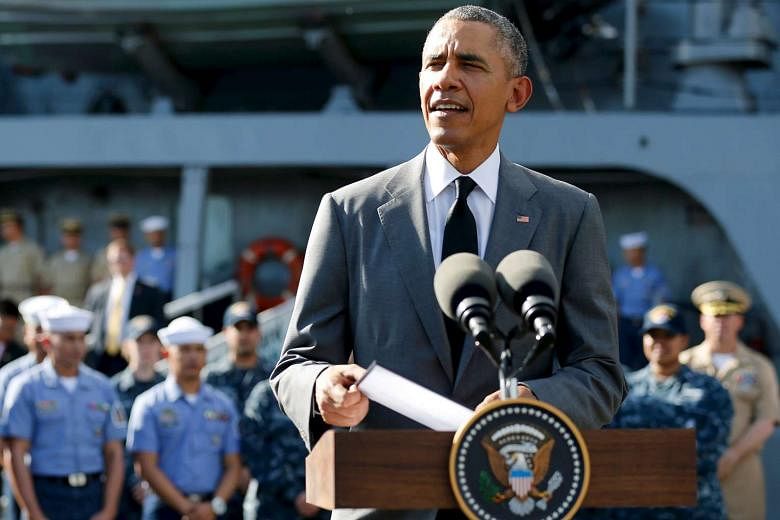MANILA (REUTERS) - US President Barack Obama affirmed Washington's commitment to the Philippines' security and to freedom of navigation in Asia on Tuesday (Nov 17), squarely putting tension over Beijing's claims to the South China Sea onto the agenda ahead of a regional summit.
Obama's comments at Manila harbour after visiting the Philippines' main warship came hours after China said it was the real victim of the waterway dispute because other countries had illegally occupied islands there.
"We have a treaty obligation, an iron-clad commitment to the defence of our ally the Philippines," Obama said after boarding the Philippines navy frigate that was a US Coast Guard cutter until 2011 but on Tuesday flew the flags of both two allies.
Obama did not mention China but the symbolism of his visit was hard to miss: the ageing vessel is now a mainstay of the Philippine Navy, operating around the Spratly islands in the South China Sea that are claimed by both Manila and Beijing.
"My visit here underscored our shared commitment to the security of the waters of this region and to freedom of navigation," said Obama, flanked by a group of about two dozen US and Philippines uniformed navy personnel.
Chinese President Xi Jinping also arrived in Manila on Tuesday for the Asia Pacific Economic Cooperation (APEC) summit, but did not make any public comments.
In Beijing, Chinese Vice Foreign Minister Liu Zhenmin said China was the real victim in the South China Sea dispute as it had had "dozens" of its islands and reefs illegally occupied by three of the claimants. He did not name any countries.
"The Chinese government has the right and the ability to recover the islands and reefs illegally occupied by neighbouring countries," Liu said. "But we haven't done this. We have maintained great restraint with the aim to preserve peace and stability in the South China Sea."
Beijing has overlapping claims with Vietnam, the Philippines, Malaysia, Taiwan and Brunei in the South China Sea, through which US$5 trillion (S$7 trillion) in ship-borne trade passes every year.
A week before the summit, US B-52 strategic bombers flew near Chinese artificial islands, signalling Washington's determination to challenge Beijing over the disputed sea.
Obama and Xi will be among about 20 heads of state and government attending the main APEC meeting on Wednesday and a leaders retreat on Thursday. The Philippines has said it will not bring up the South China Sea dispute to avoid embarrassing Xi, but it could not prevent others from doing so.
ISIS THREAT
The APEC meet is the first of two regional summits that were supposed to bolster trade and security ties but have been clouded by last week's coordinated attacks on Paris by the Islamic State in Iraq and Syria (ISIS).
The gathering comes on the heels of a G20 summit in Turkey that was dominated by discussions about the violence emanating from Syria's 4-1/2-year-old civil war.
From Manila, many of the leaders go on to Kuala Lumpur to attend an East Asia summit at the weekend.
For Obama, the latest flurry of summitry illustrates how his effort to "rebalance" U.S. policy toward Asia-Pacific countries has consistently run into the geopolitical reality that the persistently volatile Middle East cannot be ignored.
The Philippines was on high alert as the leaders arrived for the APEC meeting.
Police in Manila, a city of 12 million, closed off many roads leading to the venues of the meeting, causing heavy traffic jams. Local media said the gridlock was so bad that a woman in labour didn't make it to hospital and gave birth in her car.
Philippines officials say there has been no intelligence suggesting there might be an attack on the Manila summit but about 30,000 police and soldiers have been deployed to guard it.
The South China Sea issue was not mentioned in a draft of the APEC leaders' final statement seen by Reuters.
High up in the document, however, the leaders condemned terrorism and said they were resolved to counter it together. "Under the shadow cast by the recent attacks in Paris, we stand in solidarity with the people of France and all victims of terrorism elsewhere," the statement draft said.
Obama will likely discuss the friction over the South China Sea and military relations when he meets Philippine President Benigno Aquino on the sidelines of the summit on Wednesday.
Aquino and Japan's Prime Minister Shinzo Abe are also expected to agree on a deal paving the way for Tokyo to supply Manila with used military equipment, possibly including aircraft that could be deployed to patrol the South China Sea, sources said.
Manila and Hanoi are also due to sign a strategic partnership deal governing how their navies will work together.

